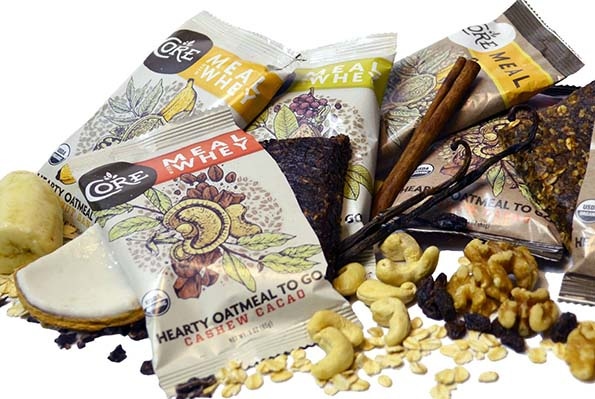November 25, 2015

CORE Foods makes organic, fresh, healthy on-the-go foods. So fresh, in fact, that they’re found in the refrigerator aisle at the grocery. The company is a not-for-profit B Corp, sowing stewardship and its golden-rule mission deep—from the supply chain to community outreach.
On Dec. 7, CORE Kitchen—the first produce-only restaurant—will open in Oakland, California. CEO Corey Rennell spoke with NewHope360 about mission-driven food production, building a company based on service and what to expect next.
NewHope360: When did you start shaping the mission for CORE Foods of the golden rule and fresh food?
Corey Rennell: I spent about 14 months living with 12 different tribes on Earth, studying traditional foods. What I learned from that experience was that healthy food is really simple: It’s basically fresh food.
In these traditional societies, community reciprocity is an inherent value. When a problem is presented to the community, they don’t ask, “Is this Joe’s problem? Is it Joe’s fault?” They ask, “The problem is here. How are we going to solve it together?”
That inspired the values system of the company: We believe we are only as successful as we are together, and if we want to ever have hope of creating a healthy food system, we really want to align the incentives of health with the business practices of food companies. We felt as though a fundamental part of that was removing the profit aspect, because if you have a food company that’s aligned with profit motives, there’s a huge incentive to lower the quality of the ingredients, which ends up not being aligned with the principle of increasing the quality of the health of the food.
NH360: On the company website, you talk about “ownership vs. stewardship.” How did you land on a not-for-profit business model and decide Core Foods should become a B-Corp?
CR: The general idea is that businesses are the engines of creating communities and building progress within communities, and we got in this habit over the past 100 years of only measuring businesses based on their own financial resources. But really a measure of a business is about how it serves the community, how it treats the people that work there, how good the product is that it produces, and what value that business can offer society.
NH360: What are examples of ways you’ve reinvested in your community in Oakland?
CR: A very simple way businesses give back are donations. Over the past two years we’ve given over 37,000 healthy meals to families in need. But what we’re more interested in are businesses that include the externalities within their operating procedures. So, if you have a powerful business, and then you give a lot to charity, what you’re really doing is you’re creating something negative as part of your business and then you’re trying to fix it somewhere else. But if instead, every aspect of your business is what it should be, the service is embedded in what you’re doing.
We’re doing that for the CORE Kitchen, which is the world’s first produce-only restaurant that we’re opening Dec. 7. We’re sourcing from low-income farmers in California that have a hard time growing their business even though they have extremely high-quality products. We’re working as hard as we can to hire the kitchen from people from workforce development—people who’ve served prison time or people who’ve had challenges to employment. We’re working with Kaiser [Permanente] to try to partner with them (for patients’) diet instructions… so we can work with them to achieve their goals to be able to get healthy again.
We’re trying to look at every aspect—where are the services that we can provide? Where can we connect with the services that people really need?
NH360: How do you share your story with customers?
CR: On our website, people can see every single farmer we work with by name, and where they are and the details of that ingredient. Transparency is a huge thing for us. We list every single ingredient that touches our food on our package. There are no hidden manufacturing ingredients.
Every year we publish an accountability report openly on our website. It includes our financial information, it includes the metrics we think are important and the challenges that are in front of us, we encourage our customers to read those reports and challenge us back and help us get even better.
NH360: Finally, you’ve talked a bit about the restaurant, how do you envision CORE Foods’ reach growing and expanding over the next year, and what are you most excited about?
CR: We’ve had an incredible experience in the grocery industry in the past five years, but I think what we’ve really learned is that when we believe that fresh food is healthier, distributing fresh food in grocery stores that have limits on how low the shelf-life can be becomes very challenging. Milk, at eighteen days, is sort of the lowest that you can get for widely-distributed items unless your velocity is just enormous. What we’re trying to do now with the CORE Kitchen is create three-, four-day shelf life items and then create a very dense refrigerated distribution system in one market to be able to deliver those things rapidly to all of our grocery partners. So where I really see the growth in health is through the grab-and-go section in grocery stores through direct-store delivery service and local suppliers.
We’re piloting this model in Oakland. We’re counting on Whole Foods and the independent grocers to help us raise the bar in the quality of the freshness of the food, and then if we see success here in Oakland, we’ll be replicating this model in all of our major cities across the country.
Editor's note: This interview has been edited for clarity and brevity.
You May Also Like



